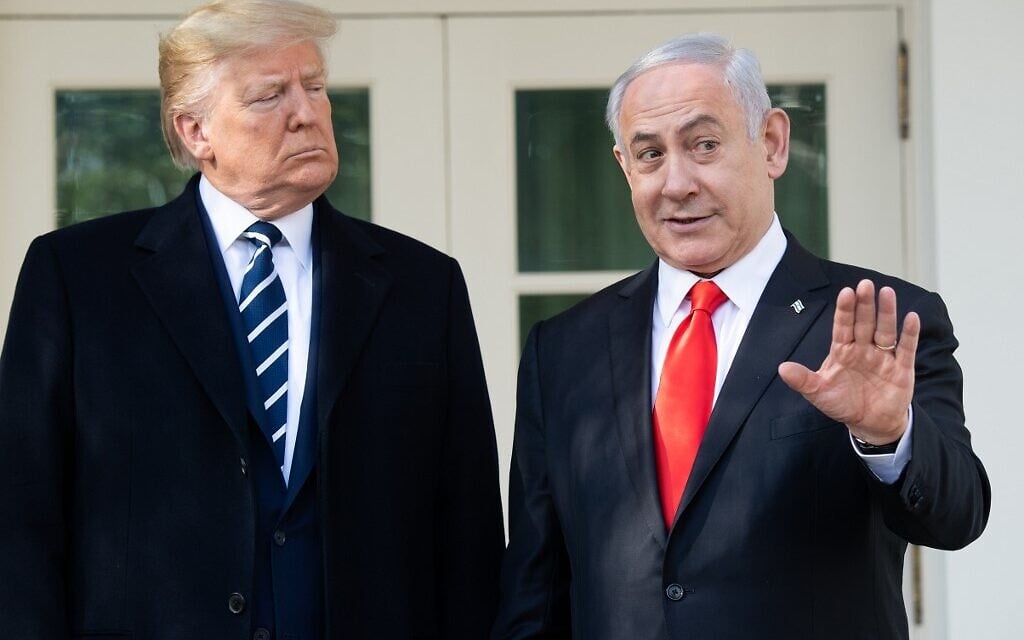Donald Trump sparks global controversy by calling Benjamin Netanyahu a “war hero,” dismissing ICC war crimes charges, and accusing Democrats of siding with Palestinians.

Former US President Donald Trump has ignited fresh controversy after publicly praising Israeli Prime Minister Benjamin Netanyahu as a “war hero,” despite the Israeli leader being wanted by the International Criminal Court (ICC) for alleged war crimes in Gaza.
In a wide-ranging interview with conservative radio host Mark Levin on Tuesday, Trump described Netanyahu as a partner in past military and diplomatic efforts. He also downplayed international efforts to hold the Israeli leader accountable.
Trump Praises Netanyahu Amid ICC Warrant
Trump defended Netanyahu against the ICC’s arrest warrant, which accuses the Israeli leader of overseeing operations that caused mass civilian casualties in Gaza.
“He’s a good man. He’s out there fighting… He’s a war hero, because we worked together. He’s a war hero. I guess I am too,” Trump declared.
By labeling Netanyahu a “war hero,” Trump not only rejected the legitimacy of the ICC’s investigation but also positioned himself as a co-architect of Israeli defense policy. His comments are likely to intensify already polarized reactions in both Washington and Tel Aviv.
Hostage Negotiations and Trump’s Legacy
Trump further highlighted his past role in hostage negotiations with Hamas, claiming personal credit for securing releases that saved Israeli lives.
“I’m the one who got all the hostages back… I got so many letters from parents and from the children themselves… none of these people would have come back, but I got them back,” he said.
The former president has long portrayed himself as a decisive actor in Middle East diplomacy. His administration brokered the Abraham Accords, normalizing relations between Israel and several Arab states. Now, with his remarks on Netanyahu, Trump appears intent on reinforcing his image as Israel’s most reliable ally.
Attacks on Democrats and Schumer
Trump also turned his attention to domestic politics, accusing Democrats of siding with Palestinians. He singled out Senate Minority Leader Chuck Schumer, suggesting that the New York senator had betrayed American allies.
“It’s unbelievable that Democrats, like Schumer, are ‘Palestinian.’ You know, he’s the Palestinian senator right now. We call him the Palestinian senator from New York,” Trump said.
The remarks, delivered with his characteristic bluntness, are expected to inflame partisan divisions in the United States. Critics argue that such rhetoric risks deepening polarization not only in American politics but also in public perceptions of the Israeli-Palestinian conflict.
Political and Global Repercussions
Trump’s statements come at a sensitive moment. The Gaza war has triggered global outrage, with humanitarian organizations accusing Israel of violating international law. The ICC’s move to issue arrest warrants against top Israeli officials represents one of the most serious legal challenges Netanyahu has ever faced.
By dismissing these efforts, Trump has once again aligned himself with Netanyahu in defiance of international institutions. His remarks may resonate strongly with his political base, which has historically supported Israel, but they are likely to face sharp criticism from human rights groups and Democratic lawmakers.
At the same time, Trump’s framing of Netanyahu as a fellow “war hero” underscores his campaign strategy heading into 2025—portraying himself as a fighter, both at home and abroad.
Conclusion
Donald Trump’s defense of Benjamin Netanyahu, coupled with his dismissal of the International Criminal Court’s war crimes charges, underscores the former president’s enduring commitment to Israel’s leadership.
By claiming credit for past hostage releases, attacking Democrats as “pro-Palestinian,” and painting himself as a partner in Israel’s military resilience, Trump has once again inserted himself into the center of the global debate over Gaza, accountability, and the future of Middle East peace.
The remarks may galvanize supporters, but they also risk deepening divisions—both within American politics and across the international community.















Comments are closed.